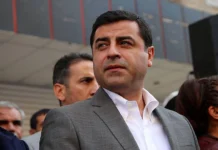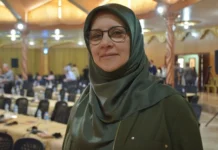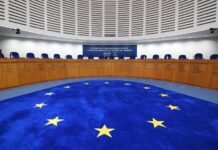Turkish President Recep Tayyip Erdoğan has promised not to release jailed Kurdish leader Selahattin Demirtaş from prison as long as he remains in power, a statement seen by many as an admission that Demirtaş’s imprisonment is politically motivated, Turkish Minute reported on Monday.
Demirtaş, former co-chairperson of the pro-Kurdish Peoples’ Democratic Party (HDP) and also a human rights lawyer, has been behind bars since November 2016 on politically motivated charges.
He was an outspoken critic of Turkey’s ruling Justice and Development Party (AKP) and its leader, Erdoğan, before he was jailed. He ran in the presidential elections of 2014 and 2018 as a rival to Erdoğan. The imprisoned leader conducted his election campaign from jail for the 2018 election.
Erdoğan was speaking at his party’s election rally in Ankara on Sunday.
“As long as we are in office, neither Selo nor that child murderer can be released, they won’t be able to get out, they will serve their sentences,” the president said, referring to Demirtaş and Abdullah Öcalan, jailed leader of the outlawed Kurdistan Workers’ Party (PKK), respectively.
Recognized as a terrorist organization by Turkey and much of the international community, the PKK has been waging a bloody campaign in Turkey’s Southeast since 1984. Öcalan was captured by Turkish security forces in Nairobi in 1999 and has been jailed on İmralı Island in the Sea of Marmara ever since.
Following Erdoğan’s remarks, Demirtaş said in a tweet, posted through his lawyers, that he would explain why the president was being “so bitter, angry and hostile” towards them in a statement he would make at 7 p.m. on Monday.
Demirtaş last week shared four decisions for his release in a series of tweets, accusing Erdoğan of ignoring the judgments of local courts and the European Court of Human Rights (ECtHR).
Listing the decisions that were rendered by the ECtHR in 2018, the Ankara 19th High Criminal Court in 2019, the Constitutional Court in 2020 and the Grand Chamber of the ECtHR in 2021, the Kurdish leader argued that it was Erdoğan who had prevented compliance with those decisions.
Erdoğan and his ruling AKP, in addition to their ultranationalist election partner, the Nationalist Movement Party (MHP), accuse the HDP of links to the outlawed PKK and also accuse other opposition parties of collaboration with it from time to time.
The HDP currently faces a closure case on charges of “attempting to destroy the indivisibility between the state and the people,” and hundreds of its politicians, including former co-chairs, are behind bars on terrorism charges, while most of the 65 HDP mayors elected in the predominantly Kurdish Southeast in 2019 have been replaced by government-appointed trustees.
The HDP said last month it would not field a presidential candidate in the May 14 elections, giving tacit support to Erdoğan’s main rival, Kemal Kılıçdaroğlu.















